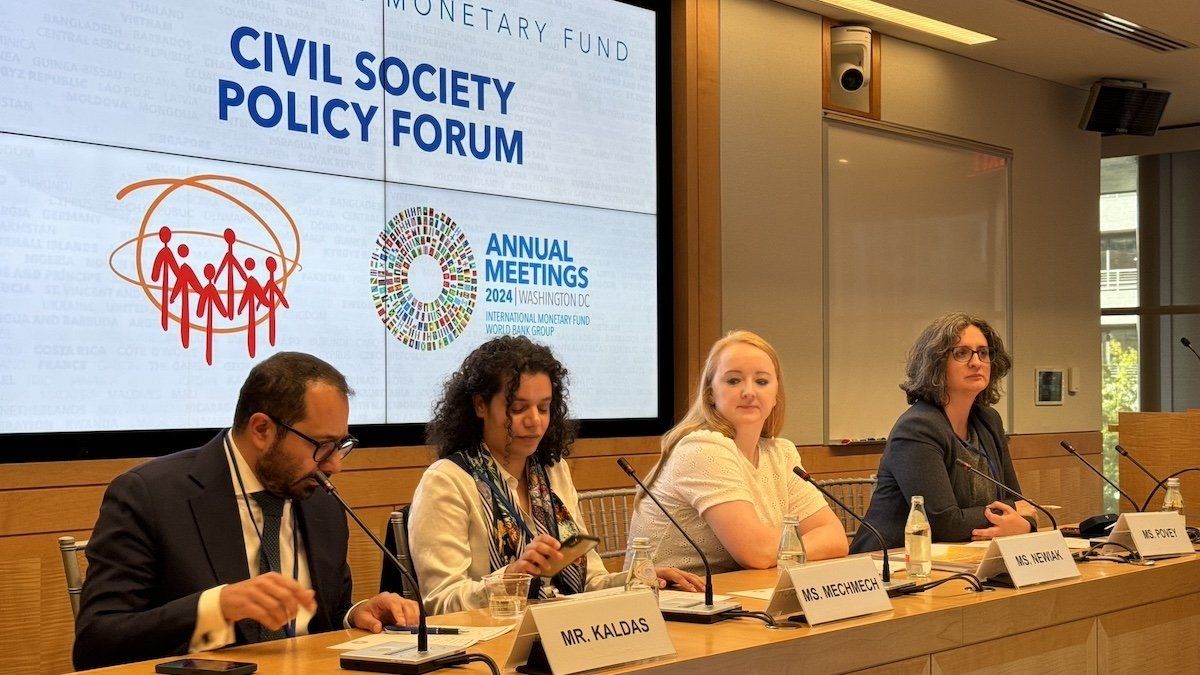October 24, 2024
When a country hits rock bottom financially, the International Monetary Fund is meant to step in with funds to stabilize the economy without damaging its society — or the gender gap. But studies show that these programs often push women out of work at a disproportionate rate to men as the economy contracts.
Alongside this week’s World Bank-IMF Annual Meetings in Washington, DC, the IMF held a policy forum on Tuesday to discuss a new tool called Gender Impact Assessments, which are designed to help build more equitable programs — and protect some of the world’s most vulnerable women.
How do IMF programs hurt women’s opportunities? In any intervention, the IMF has to consider political practicalities in its policy recommendations. All too often, said Farah Al Shami, program director for social protection at the Arab Reform Initiative, “Austerity is politically easier than implementing tax reform.” Citing examples of governments in the Middle East and North Africa, which already spend proportionally less than peer countries on social services and safety nets and have higher female unemployment, she explained that austerity measures push more women than men out of the workforce as the economy contracts, while also reducing the benefits they need. Even more politically palatable ways to raise revenue, like value-added taxation, can disproportionately burden poor women due to their regressive nature.
Why are women forgotten? Tara Povey, the gender equality and macroeconomics project lead at the Bretton Woods Project, said the approach to gender has been too “scattershot” and often falls down the priority list in negotiations. The IMF’s Gender and Inclusion Deputy Unit Chief Monique Newiak, meanwhile, said that even when gender considerations are taken into account, too much of the focus is placed on metrics like labor force participation and not enough on social aspects like child marriage and gender-based violence.
How could Gender Impact Assessments help? By reorganizing the program development process to include key questions about women — including whether policies could force more unpaid family labor on women, monopolize women’s time, or lead to more hiring discrimination — the IMF can begin tailoring more inclusive programs. Rather than suffering social setbacks, the Fund could ensure that women are at the very least not harmed, and ideally set up for greater success in a recovered economy.
More For You
As expected, the Supreme Court struck down the bulk of Donald Trump's sweeping “Liberation Day” tariffs as illegal … and almost nothing changed.
Most Popular
What's Good Wednesdays
What’s Good Wednesdays™, February 25, 2026
Sponsored posts
Small businesses at a crossroads
Chris, an Army veteran, started his Walmart journey over 25 years ago as an hourly associate. Today, he manages a Distribution Center and serves as a mentor, helping others navigate their own paths to success. At Walmart, associates have the opportunity to take advantage of the pathways, perks, and pay that come with the job — with or without a college degree. In fact, more than 75% of Walmart management started as hourly associates. Learn more about how over 130,000 associates were promoted into roles of greater responsibility and higher pay in FY25.
Ukraine's President Volodymyr Zelenskiy, Finland's President Alexander Stubb, Estonia’s Prime Minister, President of the European Commission Ursula von der Leyen and other European leaders visit memorial to fallen Ukrainian defenders at the Independent Square on the fourth anniversary of Russia's full-scale invasion, in Kyiv, Ukraine February 24, 2026.
Ukrainian Presidential Press Service/Handout via REUTERS
Somewhere in the Donbas region, Ukrainian soldier Artem Bondarenko says he hasn’t slept through the night in months as he defends Eastern Ukraine.
- YouTube
In the latest episode of Vladimir Putin and Xi Jinping's hit wellness podcast This Authoritarian Life, we learn how positive communication patterns can break negative cycles in our relationships -- especially our relationships with Iran, Syria, Venezuela, and Cuba. #PUPPETREGIME
© 2025 GZERO Media. All Rights Reserved | A Eurasia Group media company.
